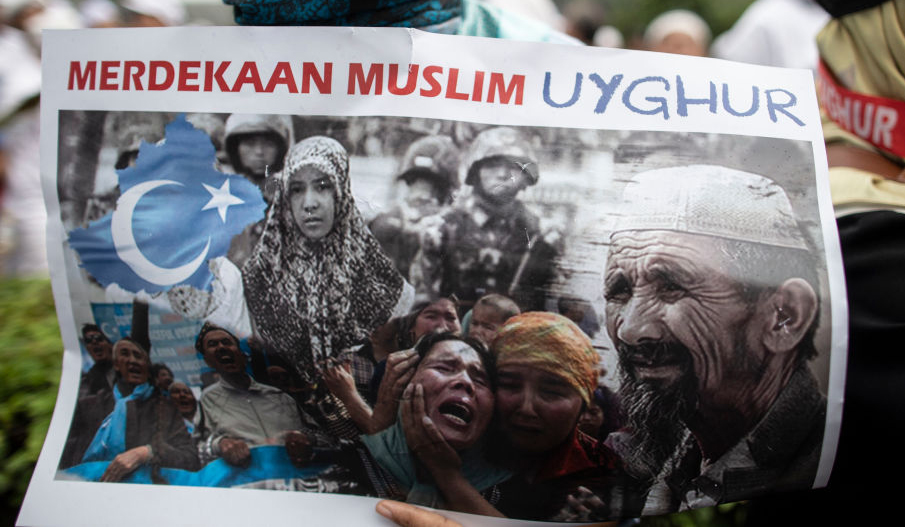Wasl Team, May 31, 2025
The Xinjiang (East Turkistan) crisis, where over a million Uyghurs suffer mass detention, forced labor, and cultural erasure, is one of the foremost human rights challenges of our time. As the world's largest Muslim-majority democracy, Indonesia has a moral obligation to respond decisively, and a strategic interest in doing so.
The coming years, perhaps the next decade, will determine whether regional powers like Jakarta help shape a rules-based order that defends minority rights, or cede moral leadership for geopolitical expediency.
While Western democracies have issued condemnations, imposed sanctions, and passed legislation, such as the US Uyghur Forced Labor Prevention Act, much of the Muslim world, including Indonesia, has remained publicly silent on the Uyghurs’ plight. In an October 2022 UN Human Rights Council vote, Indonesia sided with China in blocking a debate on the issue. This decision threatened to undermine Indonesia’s hard-won credibility as a rights-respecting, pluralistic state and could alienate a global Muslim public increasingly aware of its rights.
This silence has a cost. China’s repression of Uyghurs is not merely a bilateral issue; it threatens core principles of international law, religious freedom, and labor rights. Moreover, Xinjiang’s forced labor system taints global supply chains in textiles, solar panels, and agriculture, including sectors vital to Indonesia’s export and import economies. As international due diligence regulations tighten, Indonesian firms risk reputational and market access losses if complicit through inaction.
Over the next decade, Indonesia can, and should, shift from passive concern to proactive leadership. As a member of the Organization of Islamic Cooperation (OIC) and an influencer within ASEAN, Jakarta possesses unique diplomatic leverage. Indonesia could spearhead a joint ASEAN-OIC call for a UN fact-finding mission to Xinjiang. This move would not only reassert Islamic solidarity but also bolster ASEAN’s credibility in championing global human rights amid growing regional distrust.
Domestically, Indonesia can also act. The Foreign Ministry should implement humanitarian visa quotas for Uyghur refugees and students, providing at least 500 annual placements alongside full scholarships at leading universities. This would be both a moral act and a soft power investment. Civil society organizations, which have already organized vigils and issued statements, deserve dedicated grant funding to scale up Uyghur cultural programs and digital rights initiatives.
Indonesian trade authorities must also mandate human rights due diligence in palm oil, textiles, and mining sectors, akin to international best practices. This will not only align with emerging global norms but also shield Indonesian businesses from future sanctions targeting forced-labor-tainted goods.
Religious leaders have a pivotal role. The Indonesian Ulema Council and Nahdlatul Ulama should issue fatwas condemning the arbitrary detention and forced assimilation of Uyghurs into mainstream Han Chinese society. Faith-based diplomacy has long been a strong Indonesian asset, from the Palestinian cause to Rohingya advocacy, and it must be applied here.
On an academic level, Indonesia can lead by convening an Asian-Uyghur academic network, connecting universities for research collaboration, cultural studies, and policy dialogues. This will ensure Uyghur history and identity remain vibrant in regional studies, resisting erasure.
Above all, this is about defending the rule of law and human dignity. In the long arc of history, nations are judged not only by their prosperity or alliances but also by the causes they choose to champion in times of injustice. As evidence of atrocities in Xinjiang mounts, Indonesia faces a critical moral test.
Silence may serve temporary political interests, but it will stain the nation’s moral legacy. Jakarta must move beyond transactional diplomacy, embrace its place as a voice of conscience in the Muslim world, and lead multilateral efforts to demand accountability, protect Uyghur culture, and defend global human rights. It is not only the Uyghurs’ future at stake; it is the integrity of the global human rights system itself.
The author: Kurniawan Arif Maspul, researcher and student at the Faculty of Islamic Studies, Al-Madinah International University, Malaysia.
Published on The Strategist.

